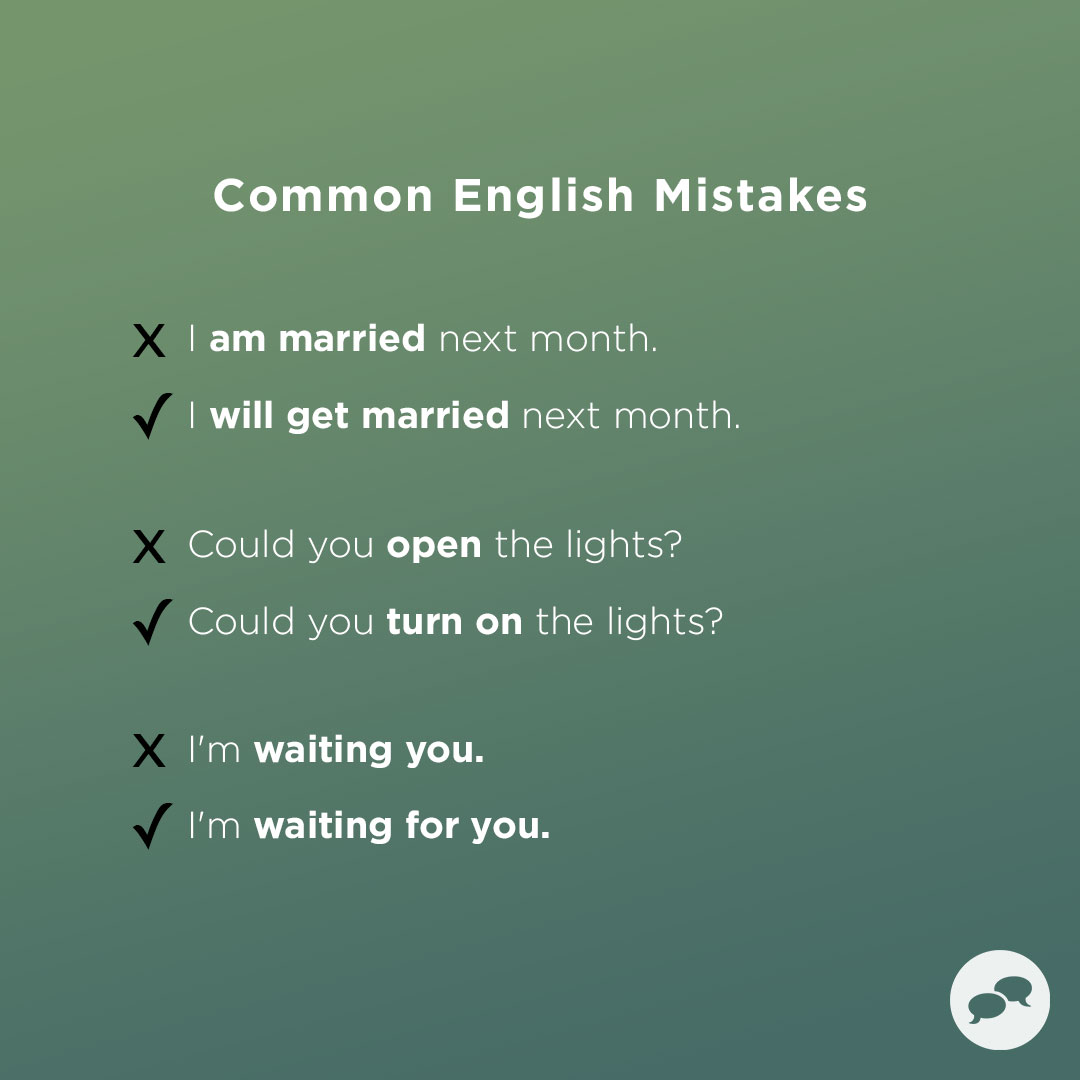Are you making any of these 9 common English grammar mistakes? If you are, don’t worry! You’re not alone.
Many native English speakers make these same mistakes. The good news is that they’re all easy to avoid once you know what they are. Read on to find out more.
Are you guilty of making common English grammar mistakes? If so, you’re not alone! Many native English speakers make similar errors.
Here are 9 of the most common mistakes and how to avoid them:
1. Mixing up your/you’re, their/they’re, and there/here
These homophones (words that are pronounced the same but have different meanings) can be confusing.
Just remember that your means belonging to you, you’re is a contraction of you are, their means belonging to them, they’re is a contraction of they are, there refers to a place or thing, and here refers to location. For example:
You’re going to love this restaurant!
(You are going to love this restaurant!)
I can’t believe they’re out of stock already! (They cannot believe they are out of stock already!)
2. Incorrect use of the apostrophe
The apostrophe has two main uses: 1) to indicate possession and
2) to create contractions. Remember that an apostrophe should never be used in place of the letter s when pluralizing a word – even if it’s just adds an extra syllable! For example:
We went to three different stores looking for lightbulbs before we found some at the store down the street (incorrect). We went to three different stores looking for light bulbs before we found some at the store down the street (correct).
3. Forgetting articles
Articles are words like “a,” “an,” and “the.” They signal whether something is specific or unspecific. Many native English speakers forget articles altogether, especially when speaking quickly. For example:
Can you hand me jar over there? (Incorrect) Can you hand me THE jar over THERE? (Correct)
4. Run-on sentences / comma splices
A run-on sentence occurs when two independent clauses (i.e., complete thoughts) are joined together without any sort of punctuation between them. A comma splice is a type of run-on sentence that joins two independent clauses with just a comma – no other punctuation mark! Both types need to be fixed in order to sound correct in English. The easiest way is usually just adding a coordinating conjunction (“and,” “but,” etc.) after the first comma:
I love spending time outdoors I also enjoy staying in sometimes and relaxing on my couch .
8 Common Grammar Mistakes in English!
What are the 10 Most Common Grammar Mistakes?
There are a few different schools of thought when it comes to grammar mistakes. Some people believe that there are certain errors that are more common than others, while others believe that any mistake has the potential to be damaging. However, there are a few general agreement among experts when it comes to the most common grammar mistakes.
1. Mixing up your tenses
Tense is one of the most important aspects of writing and speaking correctly in English. If you mix up your tenses, it can completely change the meaning of what you want to say.
For example, saying “I walk to work” in the present tense implies that this is something you do regularly. However, if you say “I walked to work” in the past tense, it means that this is something you did on a specific occasion in the past. Be careful to make sure you use the correct tense throughout your sentence or conversation.
2. Incorrect subject-verb agreement
This is a very common mistake, especially among non-native speakers of English. Remember that the subject and verb must agree with each other in number (singular or plural).
For example, if the subject is singular (e.g., “He”), then the verb must also be singular (e..g., “walks”). If the subject is plural (e,.g., “They”), then the verb must also be plural (e,.g., ��walk”). This seems like a small mistake but unfortunately it can change the meaning of your whole sentence so be careful!
3 .Using too many prepositions
Prepositions are words like “in”, “on”, “at”, etc., which help us indicate location or time.
They are very important for making our sentences clear but we can sometimes overuse them without realizing it. For example, instead of saying “I put my book on top ofthe table” we could just say I put my book onthe table – using fewer prepositions makes our language sound more natural and fluent.””
4 .Incorrect pronoun usage Pronouns take place of nouns within sentences (e…g… he , she , they , them , etc) . There are many rules governing pronoun usage – far too many to list here!
How Can I Avoid English Grammar Mistakes?
If you’re looking to avoid making English grammar mistakes, there are a few things you can do. First, make sure you understand the basic rules of grammar. This means understanding subjects, verbs, and objects, as well as how to use adjectives and adverbs correctly.
Once you have a good grasp on the basics, it will be easier to avoid making common errors.
Next, Pay attention to your sentence structure. This includes things like word order and using proper punctuation.
Sentences that are properly constructed are less likely to contain errors. Finally, if you’re unsure about something, don’t be afraid to look it up. There are many resources available that can help you with your English grammar.
By following these tips, you can avoid making common mistakes and improve your overall communication skills.
What are the Common Errors in English Grammar?
One of the most common errors in English grammar is using the wrong verb tense. This can happen when you’re speaking or writing, and it can be really confusing for listeners or readers. Other common errors include using the wrong pronoun, mixing up adjectives and adverbs, and forgetting to use articles (a, an, the).
These are just a few of the many mistakes that people make when they’re using English. If you’re not sure about something, it’s always best to look it up or ask a native speaker.
What are Five of the 10 Common Mistakes to Avoid in Writing?
There are a lot of things to avoid when writing, but here are five of the most common mistakes:
1. Not knowing your audience. It’s important to know who you’re writing for and what they want to read.
Write for your target audience and give them what they’re looking for.
2. Not proofreading. Always proofread your work before hitting publish or sending it off to someone else.
Typos and grammatical errors can make you look unprofessional and could turn off your readers.
3. Relying on spell checker alone. Spell checkers are great, but they don’t always catch everything.
If you’re not confident in your spelling and grammar skills, have someone else take a look at your work before you hit publish.
4. Writing in a tone that doesn’t match the subject matter. If you’re writing about a serious topic, keep the tone of your piece serious as well.
Likewise, if you’re writing about something lighthearted, don’t get too heavy-handed with the messaging. Know the tone of what you’re writing and stick to it throughout the piece.
5 .
Using filler words or phrases . In an effort to sound more professional or “fancy, ” people often use unnecessary words or phrases that only serve to clutter up their writing . Be direct , clear ,and concise in your language choices ,and resist the urge to pad your work with extra words .

Credit: twitter.com
Common Mistakes in English Grammar
There are many common mistakes that people make when speaking English grammar. Some of the most common errors include using improper verb tense, forgetting to use articles, using double negatives, and ending sentences with prepositions. While these mistakes may seem small, they can actually change the meaning of what you’re trying to say and make it more difficult for others to understand you.
One of the most important things to do when speaking or writing in English is to use the correct verb tense. This can be tricky because there are so many different tenses, but it’s important to try to use the right one for whatever action you’re describing. For example, if you’re talking about an event that happened in the past, you would use past tense verbs.
If you’re talking about something that’s happening right now, you would use present tense verbs. And if you’re talking about something that will happen in the future, you’ll need to use future tense verbs. Mixing up your tenses can be confusing for both yourself and whoever is listening or reading, so it’s important to pay attention to which one is appropriate.
Another mistake people often make is forgetting to add articles like “a” or “the” before certain nouns. These words are known as determiners and they help point out which particular noun we’re talking about among a group of others. For example, imagine two friends named Sarah who live in different parts of town – without an article like “the,” we wouldn’t know which Sarah we were referring to.
Adding determiners can seem like a small detail but omitting them can change the meaning of what we’re trying to say entirely.
Double negatives are also a big no-no (pun intended) when it comes to proper English grammar. A double negative happens when we accidentally include two negative words when only one is needed – this usually happens with words like “not” or “never.”
Using double negatives makes our language sound sloppy and incorrect, so it’s best avoided altogether. For example: I’m not going nowhere vs I’m not going anywhere; She don’t have no friends vs She doesn’t have any friends; You ain’t seen nothing yet! vs You haven’t seen anything yet!
Finally, another error people frequently make has to do with prepositions at the end of sentences – specifically using them when they aren’t necessary or omitting them altogether when they should be included.
Common Errors in English Usage Pdf
If you’re a fan of grammar and punctuation, then you’ll love this blog post! We’re going to be taking a look at common errors in English usage, and how to avoid them.
One of the most common errors is confusing your/you’re.
These two words are often used interchangeably, but they actually have very different meanings. Your is a possessive pronoun, meaning that it shows ownership of something. For example, “Your car is parked in my spot.”
You’re is a contraction of “you are.” So if you want to say “You are parking in my spot,” the correct word to use would be you’re.
Another common error is their/they’re/there.
These three words are also often used interchangeably, but they have different meanings as well. Their is a possessive pronoun, like your. For example, “Their house is on fire!”
They’re is a contraction of “they are.” So if you want to say “They are really nice people,” the correct word to use would be they’re. There can also be confusion with there, which can be used as an adverb or noun meaning “in that place.”
However, it’s important to note that there is no such thing as “theirs” – only their and theirs (plural).
A third common error occurs with its/it’s. Again, these two words have very different meanings and cannot be used interchangeably!
Its is a possessive pronoun – for example: “The cat slept through the storm because its fur kept it warm.” It’s is a contraction of “it is” or “it has”.
Common Errors in English Grammar Exercises
One of the most common errors that people make when doing English grammar exercises is using the wrong verb tense. For example, they might use the present simple when they should be using the past simple, or vice versa. Other common mistakes include forgetting to add -ed to regular verbs in the past simple, and using incorrect prepositions.
Another common error is confusing there, their and they’re. There refers to a place, their refers to something belonging to someone else, and they’re is a contraction of ‘they are’. Make sure you know which one you need before doing your grammar exercises!
Finally, another mistake often made in grammar exercises is mixing up words which sound similar but have different meanings. For example, ‘to’, ‘two’ and ‘too’, or ‘it’s’ and ‘its’. Pay close attention to spelling when doing your exercises and you’ll avoid making these silly mistakes.
Common Grammar Mistakes While Speaking English
We all know that grammar is important. After all, it’s the foundation of any language. Without proper grammar, our words and sentences would be a jumbled mess.
However, even native English speakers make grammatical errors from time to time. These mistakes are often made while speaking English, rather than writing it. In this blog post, we’ll take a look at some of the most common grammar mistakes made while speaking English and how to avoid them.
One of the most common grammar mistakes is using the wrong verb tense. This often happens when we want to describe something that happened in the past, but we use a present tense verb instead. For example, instead of saying “I walked to the store”, we might say “I walk to the store”.
This mistake can easily be avoided by paying attention to which verb tense you should be using and making sure you use it correctly.
Another common mistake is confusing your adjectives and adverbs. Adjectives describe nouns or pronouns, whereas adverbs modify verbs, adjectives, or other adverbs.
For example, in the sentence “She swims quickly in the pool” , “quickly” is an adverb because it modifies the verb “swims” . On the other hand, if we said “She has a quick swim in the pool” , then “quick” would be an adjective because it describes her swim . To avoid this mistake, just remember that adjectives describe while adverbs modify.
A third common mistake is forgetting to use articles (a/an/the). This often happens with plural nouns or when talking about general things rather than specific ones. For example:
-We went out for drinks with some friends from work (WRONG) -We went out for drinks with some friends from work (RIGHT) -He likes reading books about history (WRONG) -He likes reading books about history (RIGHT) In these examples above , either no article was used when one should have been ( first sentence in each pair), or an incorrect article was used ( second sentence in each pair). To fix this problem , just pay attention to whether or not your noun is specific or general , and whether it’s singular or plural .
Grammar Mistakes Or Grammatical Mistakes
One of the most common questions I get as an English teacher is whether grammar mistakes or grammatical mistakes are more important. The answer is that they both are! Here’s a closer look at each:
Grammar Mistakes
Grammar mistakes are errors in the use of words, phrases, and clauses. They can be as simple as using the wrong word (e.g., saying “I seen it” instead of “I saw it”) or as complex as mixing up tenses within a sentence (e.g., saying “Yesterday, I go to the store” instead of “Yesterday, I went to the store”).
Grammar mistakes can make your writing sound sloppy and can be confusing for readers.
Grammatical Mistakes
Grammatical mistakes are errors in the structure of sentences.
They can involve anything from incorrect verb tense usage to misplacing modifiers (e.g., putting an adjective in the wrong spot in a sentence so that it describes the wrong noun). Like grammar mistakes, grammatical errors can make your writing sound awkward and can be hard for readers to follow.
So which type of mistake is more important to avoid?
In general, grammarmistakes are more likely to lead to confusion, while grammaticalerrors tend to make your writing sound less polished. However, both typesof errors should be edited out of your final drafts before you submit themfor publication or grading. If you proofread carefully and catch allof your errors before anyone else sees your work, you’ll come acrossas a competent and detail-oriented writer—and that’s always a good thing!
Common Errors in English Language And Their Corrections
One of the most difficult things about learning a new language is mastering all of the grammar rules. Even native speakers make mistakes from time to time. If you’re learning English, you might be making some common errors without even realizing it.
In this blog post, we’ll go over some of the most common English language errors and how to correct them.
One common error is using incorrect verb tenses. For example, saying “I walk to school” when you should say “I walked to school.”
Another error is using the wrong form of a word, such as using “they are” instead of “their.” Additionally, people often mix up words that sound similar but have different meanings, like “affect” and “effect.”
If you’re unsure about whether or not you’re making a mistake, try consulting a grammar guide or asking a friend who speaks English fluently.
With a little practice, you’ll be speaking like a native in no time!
100 Common Mistakes in English
Are you an ESL student looking to improve your language skills? If so, you’re in luck! This blog post will detail 100 of the most common mistakes made in English, as well as provide tips on how to avoid them.
1. Incorrect use of articles: Articles are words like “a,” “an,” and “the” that are used before nouns. They can be one of the most difficult things for ESL students to master, as there are many rules governing their use. Some common mistakes include using “a” before words that begin with a vowel sound (e.g., “a university”), using “the” before plural nouns (e.g., “the books”), and forgetting to use them altogether (e.g., “I read book”).
2. Mispronouncing words: This is a very common mistake among ESL students, as there are often many unfamiliar sounds in English. To avoid mispronouncing words, it’s important to learn the correct pronunciation of all new vocabulary items, and to practice saying them out loud. Additionally, listening to native speakers and imitating their pronunciation can also be helpful.
3. Wrong word choice: Another common mistake made by ESL students is using the wrong word for a particular meaning or context. For example, using “big” when you really mean “large,” or using “old” when you really mean “aged.” To avoid this mistake, it’s important to carefully consider the meaning of each new vocab word you learn, and to be aware of synonyms that might be more appropriate in certain contexts.
4. Improper verb tense usage: Verbs denote actions or states of being, and each one has a specific tense that must be used depending on when the action takes place or whether it’s ongoing or completed. Common mistakes include using the present simple when you should be using the present continuous (e.g., I study English vs I am studying English), or vice versa; mixing up past simple and past continuous verbs (e..g., I talked on the phone vs I was talking on the phone); or incorrectly conjugating verbs in general (e..g., She sing every day vs She sings every day). Paying close attention to verb tenses and practicing regularly will help you avoid making these kinds of errors .
5 .
10 Common Errors in English
One of the most difficult things about learning a new language is mastering all of the grammar rules. Even native speakers make mistakes sometimes! If you’re studying English, be aware of these 10 common errors so that you can avoid making them yourself:
1. Incorrect use of adjectives and adverbs – Adjectives describe, identify and quantify people or things and usually go in front of a noun. They don’t change if the noun is plural. Adverbs modify verbs, adjectives and other adverbs and usually come after the verb.
For example:
He’s a slow driver. (adjective)
He drives slowly. (adverb)
Most adverbs are created by adding -ly to an adjective, as seen in this example.
However, there are many irregular adverbs in English which don’t follow this rule, such as hard, fast, early etc.
2. Mixing up subject and object pronouns – Remember to use I, me, we and us when you are the subject of a sentence (the person who is doing the verb), and he/she/it/they when you are the object (the person or thing that is having something done to them). For example:She likes me better than I like her.
(I am the subject; me is the object) They gave us a lift home from town.(us is the object; we is the subject) 3. Forgetting article ‘the’- We often use articles before nouns in English but sometimes we forget them altogether!
The indefinite articles A/AN are used before singular countable nouns to mean one or any – for example: I need a coffee please.(one coffee)We went to see a play at the theatre last night.(any play)The definite article THE can be used before both singular and plural countables as well as uncountables – for example:I live in Paris but she lives in THE Hague.(singular countable – referring to one specific city)We saw some beautiful flowers on our walk but now they’re all wilted because it was so hot today.(plural countable – referring to more than one flower)Have you got any apples?Yes I have – would you like one?(uncountable – apple refers to the type of fruit rather than individual items).
Conclusion
Are you making any of these common English grammar mistakes? If so, don’t worry! In this blog post, we’ll show you 9 mistakes and how to avoid them.
1. Mixing up your tenses. When you’re writing, be sure to use the same tense throughout your piece. Don’t switch back and forth between past, present, and future tense.
2. Using too many adjectives and adverbs. A few descriptive words can enhance your writing, but using too many can make it sound childish or overdone. Try to find other ways to describe what you’re trying to say instead of cramming in a bunch of adjectives and adverbs.
3. Misusing homophones. Homophones are words that sound alike but have different meanings (e.g., their/there/they’re). Be careful not to use the wrong one in your writing – it can change the meaning of what you’re trying to say entirely!
4. Not using proper capitalization . Make sure you know when to capitalize words and when not to – otherwise, your writing will look sloppy (and unprofessional). For example, always capitalize the first word of a sentence as well as proper nouns (names of people, places, things).
5. Forgetting punctuation mark s . Punctuation marks are important in helping readers understand what you’re saying – without them, your writing can become confusing or hard to follow along with . Remember to use commas , periods , question marks , exclamation points , and quotation marks when needed .
Otherwise , leave them out !
6 . Not using contractions . Contractions are shortened versions of two words (e . g., don ‘t = do not) . They’ re perfectly fine to use in most written contexts – in fact , they can often help with readability by making your sentences shorter and easier to digest . Just be careful not ‘ t overuse them or else your writing will start sounding informal or uneducated . Use contractions sparingly for the best effect .
7 Omitting articles Articles are those little words that go before nouns : a , an , the You might think they ‘re not important because they ‘re so small- but omitting them can actually change the meaning of what you ‘re trying to say ! For example : “I saw movie” versus “I saw a movie.”


